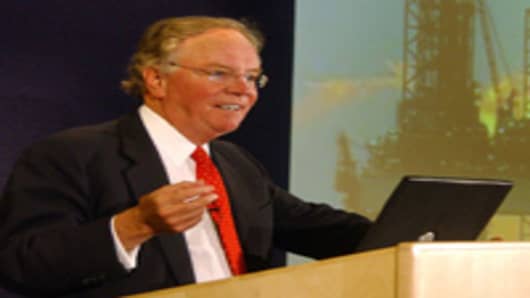The "peak oil" debate continued to rage with one of its principal proponents, energy sector investment banker Matthew Simmons, appearing on CNBC Tuesday to insist that major oil firms are "actually in liquidation."
Peak oil is the name given to the theory that the planet is in the midst of an ever-tightening supply — which in turn means oil prices will be locked into a permanent, rising arc.
Simmons' assessment of major oil companies' fate is the "grim reality," he says, of the firms even as they insist that vast potential remains from unconventional sources. Among those untapped reserves are the "tar sands" or "oil sands" of Canada — naturally occurring mixtures of earth, water and oil found largely in Alberta.
That was the contention of John Hofmeister, president of Royal Dutch Shell's US operations, who shared his views on CNBC’s "Squawk Box" last week.
“His assumptions are correct based on his hypotheses, but his hypotheses are too narrow,” Hofmeister said of Simmons. “In other words, he is looking at conventional oil only, and in the industry we look at unconventional oil as well.”
But Simmons said it's "convenient" for major oil firms like Shell to book reserves, such as its oil sands project in Alberta, but doing so amounts to an exercise in “turning gold into lead” because of the vast energy and potable water resources needed there to produce low-quality oil.
The water is converted to steam to blow oil from the sands and then to melt the tar, but this still leaves low-quality oil that is later mixed with higher quality oil to finally yield synthetic crude.
The cost of Shell’s Canada oil sands project has now ballooned to $14 billion but would yield only 100,000 barrels per day — about the same as a single major well in Saudi Arabia — making it an unsure business proposition, Simmons said.
His critique is not limited to Shell though. All major oil firms, he said, are "overlooking the fact that they are actually in liquidation, their production has been in decline for several years [and] no matter how much money they intend to spend, they just can’t get ahead of their [production] decline curves. And their proven reserves are shrinking very rapidly.”
Simmons, who is chairman of Simmons & Co. International, a specialized energy investment-banking firm based in Houston, is also the author of "Twilight in the Desert: The Coming Saudi Oil Shock and the World Economy."
Surging demand, especially from developing countries, point to an arc of higher energy prices, he added.
"Unless we have a very severe meltdown in the global economy, I think we would be better off assuming that China and India are going to lead the way of the developing countries starting to behave more and more like Japan did in the '50s and '60s," he said. (See Simmons' interview in the CNBC video at left.)
"If that happens, then we need to be prepared for for one of two things: either bringing on supply to the tune of a new North Sea every two or three years — which is impossible — or watching demand outstrip supply. And finally we [will] create shortages that literally create a run on the energy bank, just like we had a run on Bear Stearns."
One bright spot for the industry has been the performance of small exploration and production companies, said Simmons, who mentioned Oklahoma City-based Chesapeake Energy Corporation , a company that has been able to post double-digit growth in natural gas production.
He said the firm accomplished this by deploying close to 20 percent of the drilling rigs in the US, working on "fairly incidental" wells.
"But you put them all together and you have the ability to have double-digit growth," he said. "If Chesapeake were basically the size of a major oil company, they couldn’t pull it off. So they have benefited because they are small and nimble."
On Monday Chesapeake announced it's expanding its existing multi-billion dollar drilling program, and branching out into oil drilling as well. Chesapeake also plans to expand its capital budget by $275 million in 2008 and by $675 million in 2009.


